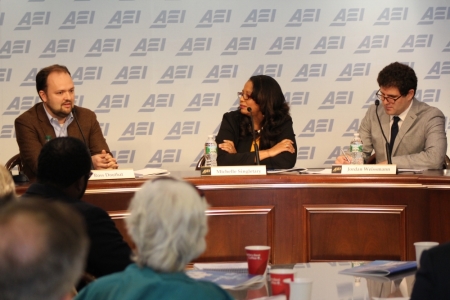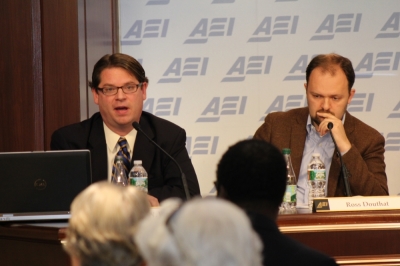Report: Families With Married Mother and Father Key to Economic Success

WASHINGTON — Intact families, or when children are raised by their married, biological mother and father, are a key factor in producing economic success and personal well being, according to a new report presented Tuesday at the American Enterprise Institute.
Those who grow up in intact homes are better educated, more likely to be employed and have higher levels of income than those raised in broken homes, even after controlling for other factors. This is one of the key findings in the report, "For richer, for poorer: How family structures economic success in America," authored by Robert I. Lerman, professor of economics at American University, and W. Bradford Wilcox, professor of sociology and director of the National Marriage Project at the University of Virginia.

Family structure matters to individuals, and the impact is cyclical, the report shows. Married men have higher levels of income, and married women do not suffer income loss and women raised in intact homes who enter the workforce flourish more than women raised in broken homes. Plus, children raised in intact homes are better educated and more likely to get and stay married, which contributes to higher levels of income.
Those raised in broken homes, on the other hand, are not as well educated, have lower-levels of income and are less likely to get married, thus perpetuating the cycle for their own children. Another cyclical effect described in the report is that men who earn more are more marriageable, and men who get married work harder, work more and earn more money.
On a national scale, the breakdown of traditional family structures has contributed to inequality in America, the report finds. High-income Americans are more likely to marry those from a similar socio-economic status and wait until they are married to have children, and to not get divorced. These well-off Americans reap greater rewards from marriage and they pass on rewards of marriage to their children.
Low-income Americans, on the other hand, are more likely to not marry, get divorced or to re-marry. Their children suffer the consequences of being raised in a broken home, thus perpetuating the growing inequalities between rich and poor.
Changes in family structure account for 41 percent of the growth in family income inequality between 1976 and 2000, the report found.
In his remarks during the panel presentation, Wilcox pointed out that inequality is a hot topic in our current political debates, but family structure is rarely mentioned during those debates.
"We have a lot of discussions these days, when it comes to economic mobility, economic success, poverty, incarceration, teenage pregnancy, about the ways in which race, ethnicity and education help to structure these important social, economic and public outcomes. But we don't think enough or talk enough about the ways family structures these outcomes.
"We find ... the family factor ... is as powerful, or almost as powerful, as things like education, race and ethnicity at predicting young men and women's family income. ... We need to reintroduce the family factor in our public conversations about these important outcomes and issues," he said.
There were discussants at the presentation from across the political spectrum, including Isabel Sawhill, a scholar at Brookings Institution, a left-of-center think tank, Michelle Singletary, who writes a personal finance column for The Washington Post, Ross Douthat, a conservative columnist for The New York Times, and Jordan Weissman, senior business and economics correspondent for Slate, who described himself as the most liberal person in the room.
Several of the discussants remarked that the report was emblematic of a growing liberal/conservative consensus on the importance of the family as public policy concern. Douthat mentioned, for instance, a "libertarian, social conservative, left-of-center" consensus on criminal justice reform due to the fact that high incarceration rates have reduced the number of marriageable men and contributed to fatherlessness in poor communities.
Weissman agreed that there is a growing recognition among both liberals and conservatives that the breakdown of families has contributed to a range of social ills, but argued that there is still a large left/right split on what should be done about that problem.
To illustrate his point, Weissman noted that one of the reports recommendations — increasing the child tax credit from $1,000 to $3,000 — is a "huge ask" because of the resulting loss of federal revenue. With that much money, he argued, the federal government could provide universal pre-K for every child.
"With a tax-cut first approach, there will be trade-offs, and a point at which consensus breaks down," he said.
You can watch the whole event at the AEI website or read the report here.





















